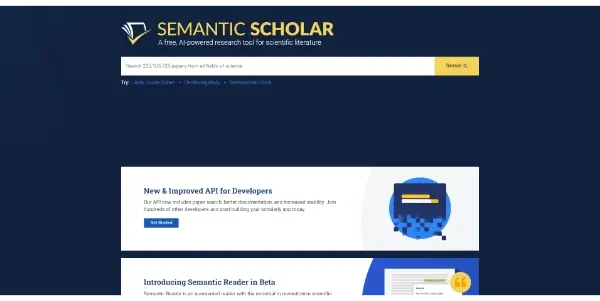Semantic Scholar

Explore 220 million scientific publications with a semantic AI search engine and a powerful API for developers
Semantic Scholar: A Deep Dive into AI-Powered Scientific Research
Semantic Scholar is a free, AI-powered search engine designed to help researchers navigate the vast landscape of scientific literature. It indexes over 220 million publications, offering a significantly more sophisticated search experience than traditional keyword-based systems. By leveraging semantic understanding, it goes beyond simple keyword matching to deliver highly relevant and contextually appropriate results. This makes it a powerful tool for researchers, educators, and developers alike.
What Semantic Scholar Does
Semantic Scholar leverages advanced natural language processing (NLP) and machine learning to understand the meaning and context of scientific publications. Unlike traditional search engines that primarily rely on keyword matching, Semantic Scholar analyzes the content of papers, identifying key concepts, relationships between concepts, and the overall meaning of the text. This allows for more nuanced and accurate search results, even when using imprecise or ambiguous search terms.
Main Features and Benefits
- Semantic Search: The core strength of Semantic Scholar lies in its semantic search capabilities. This allows researchers to find papers relevant to a topic even if they don't use the exact keywords found within the paper. It understands the relationships between concepts and can surface relevant papers based on contextual understanding.
- Paper Summarization: Semantic Scholar provides concise, automatically generated summaries of research papers, saving researchers valuable time in filtering through large amounts of text to identify relevant work.
- Citation Context: Understanding how a paper is cited in subsequent research provides valuable context. Semantic Scholar helps researchers analyze the influence and impact of a paper by showing how it's been cited and in what context.
- Paper Recommendations: Based on your search history and reading habits, Semantic Scholar suggests relevant papers that might interest you, expanding your research horizon and helping you discover related work you might otherwise miss.
- Powerful API: For developers, Semantic Scholar offers a robust API that allows integration of its search and analysis capabilities into other applications and workflows. This opens doors for creating custom research tools and integrations with other platforms.
- Open Access Focus: While not exclusively limited to open access, Semantic Scholar prominently features and prioritizes open access papers, making it easier to access and share research freely.
Use Cases and Applications
Semantic Scholar has numerous applications across various fields:
- Literature Reviews: Quickly and efficiently identify relevant papers for comprehensive literature reviews, saving significant time and effort.
- Research Discovery: Discover new and relevant research papers related to a specific topic, even if using broad or ambiguous search terms.
- Patent Analysis: Analyze patent literature to identify trends and technological advancements.
- Education and Teaching: Support educators in finding relevant research materials for their courses and assignments.
- Custom Tool Development: Developers can use the API to build custom research tools and integrate Semantic Scholar's capabilities into existing platforms.
Comparison to Similar Tools
While other research tools exist, Semantic Scholar differentiates itself through its advanced AI capabilities:
- Google Scholar: While widely used, Google Scholar relies primarily on keyword matching. Semantic Scholar offers superior contextual understanding and relevance.
- PubMed: Focuses primarily on biomedical literature. Semantic Scholar covers a broader range of scientific disciplines.
- ResearchGate & Academia.edu: Primarily social networking platforms for researchers; while they index papers, their search functionality is less sophisticated than Semantic Scholar's AI-powered approach.
Pricing
Semantic Scholar is completely free to use for both individual researchers and developers. The API is also accessible without any cost.
Conclusion
Semantic Scholar provides a powerful and free alternative to traditional scientific literature search engines. Its AI-driven semantic search capabilities, coupled with its comprehensive indexing and developer-friendly API, make it an invaluable tool for researchers, educators, and developers across various scientific disciplines. The ability to quickly summarize papers, understand citation context, and receive relevant paper recommendations significantly improves research efficiency and accelerates scientific discovery.